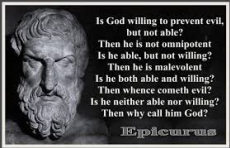

The Problem of Evil
Recap: Augustine’s viewpoint on the study of evil is largely based on teachings from the bible as he believed very strongly in its stories and teachings. Augustine took many teachings literally and proposed his theodicy to prove God’s existence as omnibenevolent, omniscient, omnipotent and to solve the problem of suffering and evil in this ‘perfect world’ that God has created. When discussing the topic of the problem of evil, there are two major assumptions, the first being that evil did not come from God since his creation is faultless and the second that evil having come from elsewhere God is justified in allowing it to stay.
If God does not have the qualities of being omnibenevolent, omnipotent, and omniscient then Augustine cannot simply justify the explanation of evil in this world using God. The idea of humans being blamed for the actions of Adam and Eve seems awfully unfair, not something a loving God would do. For example, how can we blame an innocent child for a crime committed by their parents. The idea of punishment being down to the original sin is not justifiable.
In conclusion, despite Augustine having quite a compelling argument as he gives strong explanations for the reason behind there being evil in a perfect world, criticisms have identified too many flaws in his theodicy. The idea of perfection then fall seems antiquated. For the majority of philosophers there are too many problems which either have not been explained or there are faults in Augustine’s explanations, therefore his theodicy is largely rejected. As Augustine’s theodicy has been rejected by many this proves for it to be a weak argument.
The Irenean theodicy, written in the 2nd century is described as a soul making theodicy. It views life as one of growth and development and that God created the world in two stages. The first stage as we are now and second as we develop towards the kind of full rounded moral creatures God wishes. While Augustine stated that evil comes from humans, Irenaeus proposed that humans are becoming more like God, ‘from image to likeness.’ It is theodicy is more concerned with the development of humanity. The Irenean theodicy has been recently developed in the 21st century by the philosopher John Hick.
His argument is based on two premises. It is better to arrive at moral goodness through striving for it than to be just presented with it. The second premise states that we have been created at an ‘epistemic distance’ from God in order that we can make truly free moral decisions. He cannot intervene, else freedom is lost.
Irenaeus believed that humans are created in the image of God, ‘let us make mankind in our image, in our likeness.’ This means that we are intelligent, conscious beings with a moral nature. In order for humans to have a likeness of God, humans must grow and develop our moral natures to be like God. Unlike Augustine, Irenaeus did not believe that humans were made perfect, nor does he believe the world was created perfectly.
Image- http://www.logicandlight.org/the-problem-of-evil/

0 Comment:
Be the first one to comment on this article.